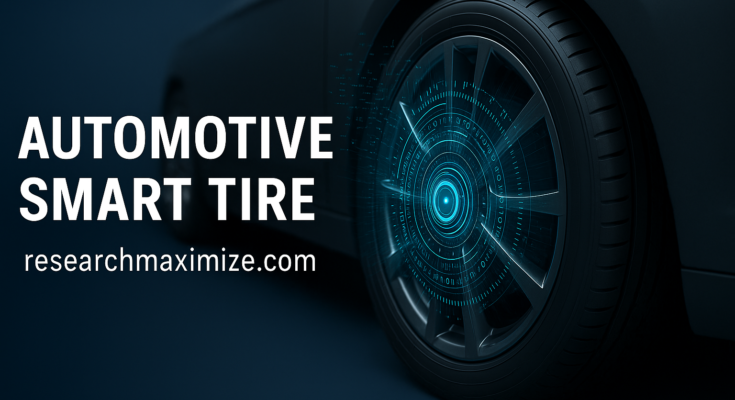Global Automotive Smart Tire Market Set to Soar to $162.5 B by 2030 at 8.1 % CAGR, Driven by Safety, Efficiency & Connectivity
Global Automotive Smart Tire Market Estimation & Definition
The global Automotive Smart Tire Market was valued at USD 88.5 billion in 2023 and is forecast to reach USD 162.5 billion by 2030, growing at a compound annual growth rate (CAGR) of 8.1 % during the forecast period from 2024 to 2030.
Smart tires are advanced tire systems embedded with sensors and connected technologies designed to continuously monitor critical parameters such as tire pressure, temperature, tread depth, and road surface conditions. These tires enhance vehicle safety and performance by transmitting real-time data to onboard vehicle systems or cloud platforms, which can then be used for predictive maintenance, optimized driving, and autonomous navigation.
Global Automotive Smart Tire Market Growth Drivers & Opportunity
Several major factors are driving the growth of the automotive smart tire market:
-
Safety Enhancements: With rising awareness among consumers and tightening global regulations, smart tires are becoming increasingly important for vehicle safety. Features like tire pressure monitoring and real-time diagnostics help reduce accident risks.
-
Fuel Efficiency: Smart tires help reduce rolling resistance, which leads to improved fuel efficiency and reduced emissions. This is crucial in meeting environmental standards and supporting sustainability initiatives across the automotive sector.
-
Rise in Connected and Autonomous Vehicles: The ongoing transformation of the automotive industry toward connected and autonomous vehicles is heavily dependent on real-time sensor data. Smart tires play a key role in providing critical vehicle-environment interaction data.
-
Fleet Optimization: Fleet owners are increasingly investing in smart tires to reduce operational costs, prevent vehicle downtime, and maximize tire life through predictive analytics and maintenance alerts.
-
Eco-Friendly Innovation: Companies are developing sustainable smart tire concepts that integrate self-generating energy systems, air purification through moss, and biodegradable materials—opening new opportunities in green mobility.
Significant Market Opportunity: The growing demand in the aftermarket retrofit segment is expected to offer significant growth potential. As more consumers look to enhance vehicle capabilities post-purchase, aftermarket providers can deliver custom smart tire kits with integrated sensor platforms.
Global Automotive Smart Tire Market Segmentation Analysis
The market is segmented into four main categories:
-
By Technology
-
Pneumatic Tires: Dominating the market share, pneumatic smart tires are used across all vehicle categories. These provide real-time pressure and wear insights while maintaining the benefits of traditional tire design.
-
Non-Pneumatic Tires: This emerging category is gaining traction in niche applications, particularly in specialized industrial and autonomous transport use-cases. Non-pneumatic tires offer benefits such as puncture resistance and minimal maintenance.
-
-
By Features
-
Connected Tires: Equipped with data transmission modules, these tires continuously transmit sensor data to cloud platforms or vehicle systems.
-
Tire Pressure Monitoring Systems (TPMS): These remain a fundamental feature in most smart tire models. They alert drivers about improper inflation, enhancing safety and efficiency.
-
Advanced Sensor Integration: Newer models include sensors for temperature, load detection, and grip monitoring. These enhance traction control and support autonomous driving systems.
-
-
By Vehicle Type
-
Passenger Vehicles: Holding the largest share of the market due to high consumer demand and regulatory pressure in developed countries.
-
Light Commercial Vehicles (LCVs): Adoption is increasing due to cost-sensitive operators recognizing the long-term savings and operational efficiency.
-
Heavy Trucks & Buses: Smart tires in commercial fleets enable predictive maintenance and maximize tire longevity, reducing downtime and maintenance costs.
-
-
By Sales Channel
-
OEM (Original Equipment Manufacturer): Major automotive manufacturers are incorporating smart tires during the production of new vehicles.
-
Aftermarket: Retrofitting existing vehicles with smart tire systems is becoming increasingly popular, especially in fleet operations and among tech-savvy consumers.
-
Global Automotive Smart Tire Market Country-Level Analysis
The automotive smart tire market is witnessing significant activity in countries such as the United States and Germany:
-
United States
The U.S. remains a leading market due to stringent automotive safety regulations and the rapid adoption of new technologies. OEMs and aftermarket providers are both active, with passenger and commercial vehicle segments showing strong growth. The country’s well-developed automotive infrastructure supports mass adoption of smart tire systems in both individual and fleet categories. -
Germany
Known for its advanced automotive engineering, Germany continues to lead the European smart tire market. German manufacturers are pioneering innovations in tire technology and integrating them into premium vehicle models. Additionally, the strong presence of luxury automotive brands in Germany is accelerating the adoption of high-performance smart tire systems.
Global Automotive Smart Tire Market Commutator Analysis (Competitive Landscape)
The competitive landscape of the automotive smart tire market features global players actively investing in innovation, strategic partnerships, and expansion.
-
Goodyear Tire & Rubber Company: Known for pioneering smart tire solutions, Goodyear has developed tires capable of communicating road conditions and adjusting tread dynamically. The company is also investing in AI-based predictive maintenance systems.
-
Bridgestone Corporation: Bridgestone’s Air-Free Concept and advanced pneumatic tire technologies are enabling greater durability and eco-friendliness. The brand is also investing in software platforms that combine data analytics with tire health monitoring.
-
Continental AG: The company is heavily invested in sensor-based systems like ContiSense and ContiAdapt, which provide drivers with detailed insights into road conditions, tire pressure, and wear. These innovations position Continental as a leader in tire intelligence.
-
Michelin Group: Michelin is focusing on connected tire ecosystems and cloud-based data platforms. It is also a pioneer in environmentally sustainable tire materials and technologies.
-
Pirelli & C. S.p.A.: The company’s Cyber Tire technology is being integrated into high-performance and electric vehicles, aligning with modern demands for high-precision driving feedback and road interaction.
-
Nokian Tyres, Hankook, Yokohama, Sumitomo: These regional players are scaling up their presence in smart tire innovation, especially in Asia-Pacific, contributing to the global competition with cost-effective and adaptive technologies.
Automotive Smart Tire Market Leading Key Players:
North America 1. Cooper Tire & Rubber Company (United States) 2. The Goodyear Tire & Rubber Company (United States) Europe 1. Continental AG (Germany) 2. Michelin Group (France) 3. Pirelli & C. S.p.A. (Italy) 4. Nokian Tyres plc (Finland) Asia Pacific: 1. Hankook Tire & Technology Co., Ltd. (South Korea) 2. Sumitomo Rubber Industries, Ltd. (Japan) 3. Yokohama Rubber Co., Ltd. (Japan) 4. Toyo Tire Corporation (Japan) 5. Bridgestone Corporation (Japan) 6. Apollo Tyres Ltd. (India) 7. Kumho Tire Co., Inc. (South Korea) 8. Maxxis International – Cheng Shin Rubber Ind. Co., Ltd. (Taiwan) 9. Falken Tire Corporation (Japan) 10. Zhongce Rubber Group Co., Ltd. (China) 11. Giti Tire Pte. Ltd. (Singapore) 12. MRF Ltd. (India) 13. Nexen Tire Corporation (South Korea) 14. Cheng Shin Rubber (Maxxis) (Taiwan)
Global Automotive Smart Tire Market Conclusion
The global Automotive Smart Tire Market is undergoing a dynamic transformation driven by digitalization, regulatory frameworks, and changing consumer expectations. With the market projected to nearly double by 2030, the industry presents substantial opportunities for innovation, partnerships, and technological breakthroughs.
Smart tires are not just a futuristic concept—they are quickly becoming a standard component of modern mobility. From enhancing safety and fuel economy to enabling autonomous navigation and eco-conscious travel, the benefits of smart tires extend across the automotive ecosystem.
Manufacturers, investors, and mobility leaders must now embrace the sensor-driven, data-centric evolution of tire technology to remain competitive in this high-growth market. The next frontier lies in integrating smart tires seamlessly with vehicle operating systems, AI platforms, and cloud data infrastructure—paving the way for safer, smarter, and greener transportation.
Read More :
https://researchmaximize.com/global-material-handling-robotics-market-size/



